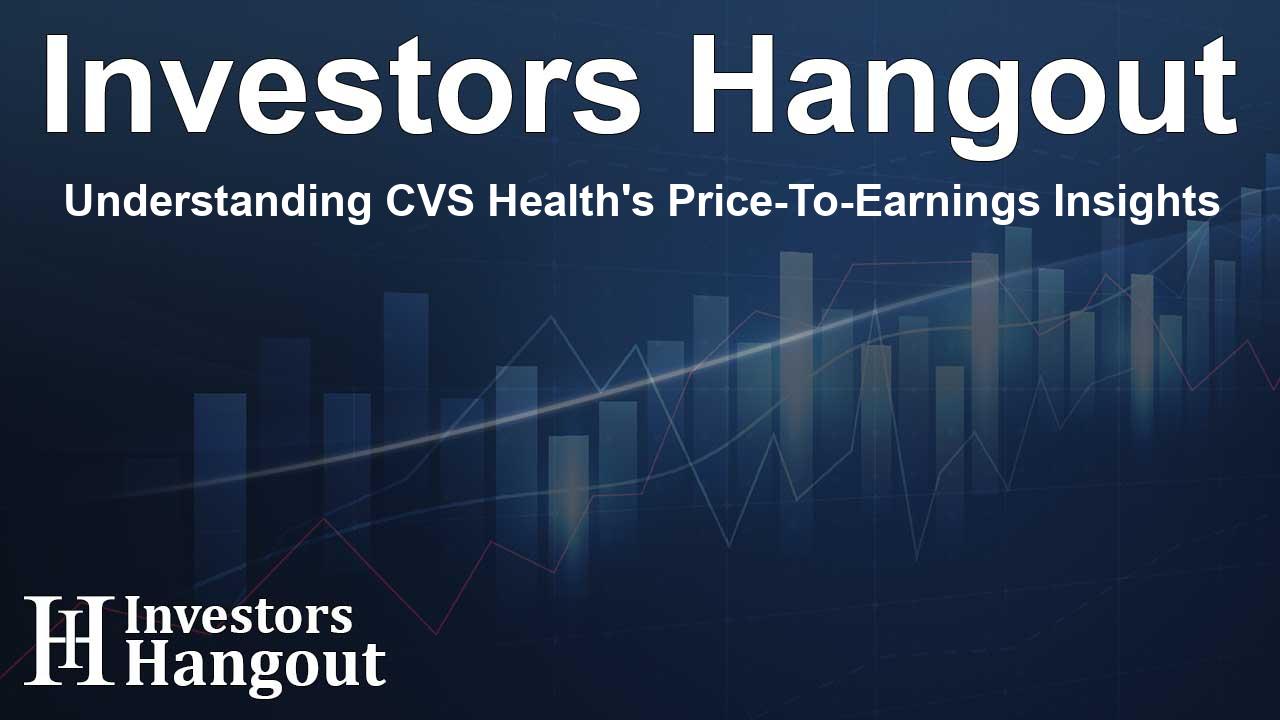Understanding CVS Health's Price-To-Earnings Insights

Examining CVS Health's Current Market Position
In today's dynamic market, CVS Health Inc. (NYSE: CVS) displays a share price of $63.52, reflecting a modest increase of 0.16%. Despite a 4.70% decline in the past month, it has seen an annual rise of 9.82%. Investors may want to assess whether the stock is overvalued despite the company’s steady performance.
Deciphering the Price-to-Earnings Ratio
The P/E ratio serves as a critical tool for long-term shareholders, allowing them to compare a company’s market performance with historical earnings and broader market data. A lower P/E ratio may hint that investors do not foresee strong future performance or, conversely, that the company is undervalued.
CVS Health Compared to Industry Peers
Presently, CVS Health’s P/E ratio is lower than the industry average of 107.05 for the Health Care Providers and Services sector. Such a comparison often invites speculation about the potential underperformance of the stock against its peers, yet it may equally signify that CVS could be undervalued in the eyes of discerning investors.
The Importance of P/E Ratio in Investment Decisions
Understanding P/E ratios can offer valuable insights into a company’s market health, but it has limitations. While a lower P/E might suggest undervaluation, it may also imply a lack of expected growth from shareholders. Investors should be cautious not to rely solely on this metric, as it is essential to consider a variety of factors including industry movements and economic cycles that can significantly affect stock pricing.
Evaluating Future Growth Potential
When contemplating an investment in CVS Health, it is imperative to assess future growth potential alongside the P/E ratio. Often, analysis requires looking beyond mere numbers to include qualitative factors that could influence the company’s trajectory. Engaging with diverse financial indicators will empower investors to make more informed decisions regarding their portfolios.
Concluding Insights into Stock Valuation
The price-to-earnings ratio undoubtedly holds its place in evaluating CVS Health’s market performance, yet it should be analyzed with caution. While it can indicate potential undervaluation, it must be contextualized alongside other available financial metrics. Therefore, investors are encouraged to utilize the P/E ratio as part of a broader analysis framework to comprehensively evaluate potential investments.
Frequently Asked Questions
What is the current share price of CVS Health?
CVS Health is currently trading at around $63.52.
How does CVS Health's P/E ratio compare to the industry average?
CVS has a lower P/E ratio than the industry average of 107.05, indicating potential undervaluation.
Why is the P/E ratio important for investors?
The P/E ratio helps investors assess market performance and potential future growth relative to earnings.
What should investors consider alongside the P/E ratio?
Investors should look at qualitative factors, industry trends, and other financial metrics when evaluating a stock.
Is CVS Health undervalued based on its P/E ratio?
Given its lower P/E relative to peers, CVS Health may be seen as undervalued, but this should be supported by further financial analysis.
About The Author
Contact Riley Hayes privately here. Or send an email with ATTN: Riley Hayes as the subject to contact@investorshangout.com.
About Investors Hangout
Investors Hangout is a leading online stock forum for financial discussion and learning, offering a wide range of free tools and resources. It draws in traders of all levels, who exchange market knowledge, investigate trading tactics, and keep an eye on industry developments in real time. Featuring financial articles, stock message boards, quotes, charts, company profiles, and live news updates. Through cooperative learning and a wealth of informational resources, it helps users from novices creating their first portfolios to experts honing their techniques. Join Investors Hangout today: https://investorshangout.com/
The content of this article is based on factual, publicly available information and does not represent legal, financial, or investment advice. Investors Hangout does not offer financial advice, and the author is not a licensed financial advisor. Consult a qualified advisor before making any financial or investment decisions based on this article. This article should not be considered advice to purchase, sell, or hold any securities or other investments. If any of the material provided here is inaccurate, please contact us for corrections.
